A school is used as an army recruitment office.
Despite the best efforts of the state, the voluntary system used to sign up recruits in 1914 and 1915 was not producing the results the government needed, so it passed a Military Service Act in January 1916 conscripting all unmarried men between the ages of 18 and 41. A second Act, passed in May, called up married men. The acts also set up a system of hearings to allow people to make claims for exemption, for example on grounds of religion or conscience. Poor health was still a great problem, though, and only 36% of the men examined in 1917 were suitable for full military duties, while 40 per cent were classified as incapable of physical exertion.
At the beginning of 1916, the German blockade of supplies for Britain was reducing not only the amount of food available. On 9 February The Glasgow Herald, one of the two newspapers that Thomas read to follow the progress of the war, told its readers: ‘As the imports of paper and papermaking materials will be much restricted by the government, we shall not be able to place The Glasgow Herald so freely on sale as has been the custom in the past. Newsagents’ supplies will be restricted to those copies actually ordered by customers, so that readers should in all cases place orders for a regular daily service.’
The Germans began an escalating series of air-raids on the east coast of Britain, especially targeting London, which was first hit by a Zeppelin on 31 May 1915. In 1916, the government responded with a total black-out in areas thought to be at risk of air-raids. This extinguished all but the most essential outside lighting, and ordered householders and businesses to place heavy curtains on all windows and doors so that no light escaped. Thomas notes that all of Glasgow was darkened by the end of February 1916.
New year opens with wind and rain. We went to the Cinerama after dinner. P&O liner Persia sunk near Crete by U-boat.1
About 335 lives lost.
Monday, 3 January
Brothers, who have the harder fate –
The men who fall or the women who wait?
Tuesday, 4 January
Albania joins the Allies. War declared against Austria.
Wednesday, 5 January
Bill introduced to compel unmarried men to enlist. Derby groups 6, 7, 8 and 9 called up for 8 February.
Friday, 7 January
Agnes baking at night. Getting ready for tomorrow.
Saturday, 8 January
Fine day. Mr and Mrs Gordon and family here about 5.15 p.m. We had a night of song and dance. Carriages at 11 p.m.
Showery day and very stormy. As we were expecting Hetty Cook at night I did not go to church. Hetty arrived about 5.30. She went away about 10.30. The last car had gone, so I walked home with her, which was ‘the goods’. The walk back was not ‘the goods’.2 I arrived home at 12.05 a.m. to my anxious wife.
Monday, 10 January
Wild day. More rain. British Naval losses to date. Battleships: King Edward VII, Bulwark, Triumph, Formidable, Irresistible, Goliath, Ocean, Majestic. Cruisers: Natal, Argyll, Good Hope, Monmouth, Aboukir, Hogue, Cressy, Amphion, Pathfinder, Hermes, Hawke, Pegasus.
Tuesday, 11 January
A gathering of the clans at Greenlodge, so Agnes went there about 6 and I straight from my work. Spent a musical evening and played divers foolish games. Agnes, Tommy and I got home at 12.15 a.m. Gallipoli completely evacuated by British and French. The Turks are top dog this time.
Wednesday, 12 January
Sat in at night and listened to the wind. Austrian successes in Montenegro, which means Montenegro will share the fate of Serbia and Belgium.
Thursday, 13 January
British victory at the Tigris.3 Kaiser very ill.
Cold, dull day. We went to see Hetty Cook and her ma at 5.30 p.m. We played dominoes and arrived home 10.45 p.m. Dykes burst in Holland; great damage.4
Sunday, 16 January
Weather like unto yesterday. This is Communion Sunday so went to church. After dinner Tommy and I went out a walk. Shortly after 8 p.m. Sam and Nellie gave us a visit. They went away at 10.30. Sam had on his armlet. Ex fuma fama.5 Tremendous fire in Bergen.6
Monday, 17 January
During 1915, nine spies were shot in the Tower.

Tuesday, 18 January
Nice mild day. We all went out a walk at night. Montenegro
sues for peace. British blockade of Germany to be tightened.
Wednesday, 19 January
Wet, stormy day. Austria and Montenegro arranging terms.
Thursday, 20 January
Thunder, lightning, hurricanes, rain, hail, sleet. Agnes cleaning
out the room all night. Negotiations broken off between Austria
and Montenegro. Fighting again.
Dirty, wet day. Agnes in town in the afternoon. She bought me a new tie. Nannie Gordon here at night. British submarine wrecked off Dutch coast. Crew saved.7
Saturday, 22 January
Wind, rain, hail, thunder and lightning. I went to Pollokshields Library at night. Great Russian victory in the Caucasus.8
Sunday, 23 January
Stormy sort of day. Donned my uniform and took Tommy out a walk. German aeroplanes raid Kent coast. One man killed.

Monday, 24 January
Dry day, but wild. Stormy night as per usual. Agnes baking at night. We entertain tomorrow night. British relief force held up on the Tigris. Heavy losses.9
Tuesday, 25 January
Wet, windy sort of day. Mr and Mrs Ferguson, Lily and Isa and Duncan here at night. We had a night of music and revelry. Nobody killed. They all went away at 11 p.m. German seaplane attacks Dover, but gets chased.
Wednesday, 26 January
Agnes went to Ibrox in the afternoon. I reversed the waxcloth in the lobby at night to make folk think we had new stuff. German air raid on Dunkirk. Five persons killed.
Dry sunny day. Total British casualties (all fields) to 9 January. Killed 128,138. Wounded 353,283. Missing 68,006. Total 549,427.
Friday, 28 January
Got my hair cut. Agnes indignant.
Saturday, 29 January
Paid the factor today. Rent reduced to pre-war times, according to the law.10 Dull day. I went to library in Langside at night. Austria has wiped Montenegro off the map.
Tuesday, 1 February
Went straight to Sam from my work. Agnes and Tommy there, then we all went to a church concert. Sam helped the choir to make a noise. Big Zeppelin raid all over England. 67 killed and about 100 injured.
Wednesday, 2 February
Nice day. Agnes in the wash-house all day. The missing liner Appam turns up at an American port with a German Prize Crew on board.11
Thursday, 3 February
Cold, wet day. When I came in at night, Hetty was in. Then May came. After tea Nannie Gordon arrived. This is the age of females: lady car drivers, lady car conductors, lady lamplighters, lady postmen, lady mail van drivers, lady railway porters, lady ticket collectors.
The Livingstones of Govanhill were a representative example of an upper-working-class family in Glasgow at the start of the First World War. Thomas was employed as a mercantile clerk, Agnes had resigned her job as a cardboard cutter after her marriage, and they lived in a typically working-class tenement flat. Their house had an inside toilet but no bathroom, so bathing would have taken place in a tin bath in front of the fire, filled with water boiled on the coal-fuelled kitchen stove. Thomas writes of visiting relatives to use their bath, using the bathing (not swimming) facilities at Govanhill Baths, and stopping by the ‘religious baths’ in the Gorbals, intended for Jewish people to purify themselves before attending synagogue.
When Wee Tommy started school, he attended Victoria Primary School, on the corner of Hollybrook and Batson Streets in Govanhill. This was opened as Victoria Public School in 1905 by the Glasgow School Board, regarded as one of the leading boards in Scotland. It set high standards by employing only qualified teachers, and taking over from a number of charities the responsibility for distributing clothing and footwear to needy children and eliminating half-time education – which allowed children under 13 to spend half their time in school and the other half working – before the law required it in 1918.
Thomas and his wife Agnes had parallel systems of finance, both funded by Thomas’ wages. Agnes’ share of the budget covered food and cleaning materials, clothing for herself and her son, replaceable household goods, such as gas mantles, and transport costs for her visits to friends and family. Thomas was responsible for rent, household insurance, gas and coal, his own clothing, transport, pipes and tobacco, newspapers, family outings to the cinema or music hall, holidays and meals bought outside the home.
Before the outbreak of war, the roles of men and women had remained essentially unchanged for generations. Men were expected to be breadwinners; women were expected to obey their husbands, cook, maintain a clean and tidy house, and raise their children. If they did work outside the home, women were expected to leave their jobs when they married and devote themselves to looking after their families. Some employers had this as an explicit policy and were unwilling to hire married women who might leave at inopportune moments to have children. The First World War changed much of this, however. With the success of the pals’ battalions that allowed men to volunteer and serve with friends and colleagues, women were called upon to fill the vacancies left by local men departing for the front. One such unit was Glasgow’s 15th Highland Light Infantry, or ‘Tramways Battalion’. As a result, in 1918, the number of women employed on Glasgow’s tramway system peaked at 2,388, of whom 308 were tram drivers. They also took the place of men in other trades, and in munitions work in factories. Thomas, at first mesmerised by the sight of women working as conductors in 1915, seems hardly bothered when one turns up to whitewash his ceiling in 1917.
One of the unintended consequences of women working outside the home was the increased family income, which resulted in better fed and clothed children. Women’s increased independence, their experiences in working as a group in industry and their demands for voting rights were not accepted with equal approval across society, however. While women were deemed suitable replacements for men as clerks, shop assistants and teachers, male trade unionists in the heavy industries that predominated on Clydeside were exceptionally, even militantly, concerned about ‘dilution’ caused by women in the workforce. They feared that women would choose not to join unions or that they would provide softer targets for management pressure, thus reducing the unions’ power.
Women, meanwhile, were being encouraged by the Suffragist movement to demand the same rights as men to vote and to stand for parliament. The authorities who were happy to take advantage of women’s labour were not so keen on this challenge to the traditional social order. Just after Emmeline Pankhurst stood up to speak at a Suffragist meeting in the St Andrew’s Halls in Glasgow (the façade of which fronts the Mitchell Library in Granville Street) at 8 p.m. on 9 March 1914, the platform was charged by 120 Glasgow police officers, one of whom had a warrant for her arrest. One eye-witness, Leonard Gow, wrote: ‘After Mrs Pankhurst had been speaking for a very few minutes, the platform, which, please mark, was occupied solely by women, old and young, was rushed by detectives and policemen with drawn batons who laid out in all directions, hitting and felling women whose only offence was that they crowded around their leader evidently trying to protect her from violence.’
Cold, dry day. Tommy not well. Zeppelin found wrecked in North Sea by a trawler. Being sensible men, they left Zeppelin and its crew to their fate. Great fire at Ottawa. Canada
House of Parliament burned down. Seven lives lost. Germans suspected.12
Tuesday, 8 February
Weather appalling. Up to the neck in snow, slush, rain etc. So I’ve got the cold. I went myself to Sam’s at night. Family re-union etc. Derby groups 10, 11, 12 and 13 called up for 29 February.
Wednesday, 9 February
Compulsion for the army is now law.
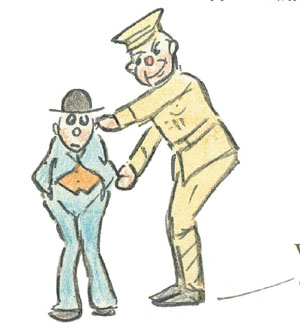
Thursday, 10 February
Tommy got new trousers today. Air raid on Kent by two German seaplanes. Two women and one child hurt.
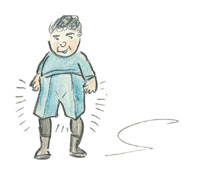
Saturday, 12 February
I went to Govanhill Library in the afternoon. Glasgow is going to be in darkness on 1 March, so help me bob. British minesweeper sunk in the North Sea by German torpedo boats. Hoch!13
Rose about 7 a.m. this morning, in full possession of my faculties and went to Queen’s Park and did not hear the cuckoo. Hail, snow, wind and rain all day.
Monday, 14 February
Vile day of snow and sleet. I made a book case for the pantry on 17 July 1913. I broke it up on 14 February 1916 for firewood. The famous British cruiser Arethusa wrecked by a mine. Ten lives lost.14
Tuesday, 15 February
All unmarried men called to the colours. My turn next. Ora pro nobis.
Wednesday, 16 February
Vile, unholy weather. Snow, rain, everything.
Thursday, 17 February
Agnes did some ironing at night. I broke the teapot tonight. Great Russian triumph. Fall of Erzerum.15 Big blow to the Turks.
Friday, 18 February
Rained and snowed all day. Streets in a high old mess. Cameroons campaign ended.16 We have only to smash up German East Africa now, and Germany is without a colony. Once again, Roumania is preparing for war.
Saturday, 19 February
Very nice day. We all went to Ibrox at night. They have a new piano there, so I went to bless it, so to speak. We had an evening of song and music. This is pay day.
I took a walk to Bellahouston Park before dinner. In my absence, Tommy tried the edge of the shovel on his head, and lost.
Tuesday, 22 February
I took Agnes and Tommy to the Cinerama tonight. The French bring down a Zeppelin. Crew all killed. Six German aeroplanes shot down. Good business.
Wednesday, 23 February
Very cold day. Tommy went out a message himself today. I made a sort of blind for the bathroom in order to escape a £100 fine.17
Thursday, 24 February
Very cold day. Rain at night. Jenny Roxburgh here in afternoon to tell us not to come to Clydebank on Saturday as her father fell off a building. It’s a hard world. Everybody buying green blinds just now. My patent blind a failure, so I painted the globe of the bathroom gas, which was a great success.
Friday, 25 February
Tonight’s the night all Glasgow darkened. Took my life in my hands and went over to Greenlodge myself. Great German offensive at Verdun. Terrific battle raging.
The Battle of Verdun raged from February to June 1916, as the German forces made three prolonged and determined assaults on the French fortress of that name in north-east France. The Germans planned to burst through the Western Front here and make a fresh attempt to capture Paris, but they were resisted, at an enormous cost in men and munitions. The French sustained 550,000 casualties, while the Germans suffered 434,000.
Saturday, 26 February
Dirty, wet, cold day. Snow at intervals. Took Agnes and Tommy to the town at night in order to see the … illuminations? We came home duly depressed. Cuss all Zeppelins. This is a view of Morgan Street.

Sunday, 27 February
Dirty day of sleet and snows. I did not go out at all. Made myself comfortable and amused the wife and family. Large P&O liner Maloja mined in the English Channel. About 150 lives lost. Steamer that went out to assist her also struck by mine.18
Monday, 28 February
Broke some wood wherewith to light the fire. Titanic battle still raging at Verdun. Terrific German losses.
Our only lamppost in Morgan Street has got a coat of paint on the globe to make it still darker. I’ll need to wear a collier’s lamp on my hat.

Thursday, 2 March
Military Act in operation today.19 A seaplane raids south-east coast of England. A baby killed. Verdun battle stopped meantime.
Friday, 3 March
First groups of married men called up for 7 April, groups 25 to 32. I’m in group 39, so I’m in the next lot.
Sunday, 5 March
Dull day. Nannie Gordon here about 4.30 p.m., so we all went out together. We took car to Ruglen and visited the cemetery where poor Lily lies. We went round Grey’s Road and got car home from Burnside. I saw Nannie all the way home as everything is so dark. Went up and had a cup of tea with them. Tommy went out for a paper today.
Tuesday, 7 March
Tommy out playing today. Germany going to blockade Britain for ever with submarines and mines.
I took Agnes and Tommy to the Majestic. Streets most awful dark. Our lamppost at the corner has got another coat of black paint. German fleet reported in the North Sea.
Thursday, 9 March
Duncan has been commanded to report himself for service in a fortnight. Me next. Agnes kind of worried. Russians marching on Trebizond. Germany and Portugal nearly at war.
Friday, 10 March
Very cold weather. Nothing special to report. General Smuts makes a good start against German East Africa. Germany declares war on Portugal. ‘Gott Strafe Portugal.’ Since the beginning of the war, the Germans have murdered 127 British civilians by bombardment, 276 British civilians by air raids, and 2,750 British civilians by drowning.
Monday, 13 March
Cold, wet sort of day. I went at night and had a wash in the religious baths, which makes me doubly good.20 Tis reported my group will be called up on 17 April. So there you are, and where are you? British auxiliary steamer mined in North Sea: 14 lives lost. Russian torpedo boat mined in Black Sea.
Tuesday, 14 March
To ‘keep the Home Fires burning’ I broke some wood tonight.21 Agnes made jam at night.
The government have postponed calling up my group for a little. Austria declares war on Portugal. Verdun battle resumed once more.
Thursday, 16 March
Von Tirpitz (Pirate in chief) resigns.22 German retreat in East Africa. ‘In this world, a man must be either anvil or hammer.’23
Saturday, 18 March
Agnes and Tommy away with the Carmichaels to a cake and candy sale. I went to the Langside Library. German losses at Verdun are said to be now 300,000.
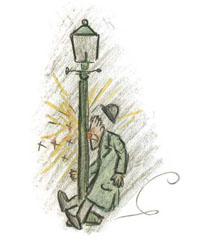
Tuesday, 21 March
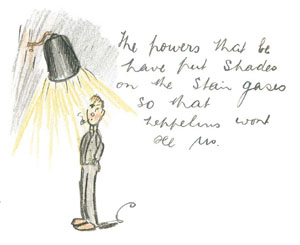
Wednesday, 22 March
Very cold day. Spring commences?! Lampposts in the town are being painted white so that we will not knock them down at night.
Thursday, 23 March
Heavy fall of snow in the morning. Miss Galloway, our typist, home with me tonight. She is a singist, so we did some warbling. She went away about 10.30 p.m. To guard her life I saw her all the way home. Got home myself 11.45 p.m. Riots and mutiny all over Germany.
Wild snow storm all day. Worst we’ve had for years. After tea we all went into town to the Salon Picture House and saw She and came home duly edified.24 Word to hand today of a naval duel in the North Sea between British armed liner and German raider, both sunk. The German survivors landed at Leith. German submarine also reported captured.

Monday, 27 March
Agnes and Tommy at a Kirk concert with Mrs Carmichael etc. I stayed at home, broke sticks etc. My beloved got home about 11 p.m. American liner sunk by the German pirates.
Wednesday, 29 March
Serious strikes with Clyde workers. Some of the leaders arrested.25 German destroyer rammed by British cruiser in North Sea. Not a single German blighter saved.
Thursday, 30 March
Wet day. Having a night of it. My father here at tea time. Hetty Cook and May Crozier here at 6.45 and Duncan about 8 p.m. Duncan brought a photo frame. Duncan rejected by military doctors. The ‘Bantams’ are now in France.26
Lovely day. Warm sunshine. We all went to Queen’s Park after dinner, took car from there to Thornliebank and car from Rouken Glen to Paisley. Green car back from Paisley, and came off at Ibrox, and went up and had our tea with the Gordons. Home 10.10 p.m. All the lampposts in Govanhill were out, so I’m afraid the Zeppelins have reached Scotland at last. Another air raid over England last night: 16 killed, 100 injured.
Monday, 3 April
At last, Zeppelins attacked Scotland last night. Great damage in Edinburgh and Leith: 10 killed. An air raid also on England.
Tuesday, 4 April
Agnes in wash-house all night. I put Tommy to bed all by myself. Great German losses at Verdun. Clyde strike ended.
Friday, 7 April
Dull, wet sort of day. Insured my household effects today against air raids. Cuss the Zeppelins. French beating back German attacks at Verdun. Vive la France! Ils ne passeront pas.27
Saturday, 8 April
The Gordons stormed our house about 6 p.m. We had an evening of mirth and song. More boats sunk. The submarine menace is getting serious.
Feeling vigorous, I went to Queen’s Park before breakfast. In the afternoon, we all went out by Cathcart and Mount Florida. Duncan here at night. He reports Donald as being very ill.

Tuesday, 11 April
Wind, rain and hail. Agnes over at Greenlodge to see how Donald was keeping. Another spy shot in the Tower.
Thursday, 13 April
Cold, windy day. Broke a few sticks à soir. Agnes went out tonight for a walk. She came back in 10 minutes. Glasgow Socialist gets three years for sedition.28 British fiercely attacked at Ypres.
Saturday, 15 April
This is the 619th day of the war, the 53rd day of the Battle of Verdun, and the 129th day of the Siege of Kut.
Pouring wet day. I went to church. Communion. After dinner I went over to Greenlodge to see how Donald was keeping. America doing a war dance just now.
Friday, 21 April
This being Good Friday, I ate a ‘Hot Cross Bun’. Germans gain a trench and two craters from British at St Eloi. Russsian army landed in France to help the Allies. French take offensive at Verdun.
Saturday, 22 April
According to arrangement, we all went down to Ibrox in the afternoon. Nobody was there when we arrived, so we all came home again. I cussed and swore. British regain lost ground at St Eloi, and so the game goes on.
Sunday, 23 April
I gave Agnes her usual cup of tea at 7 a.m. and then I went out to Queen’s Park. I’ve got the cold. Agnes got the cold. Tommy got the cold.
Tuesday, 25 April
German steamer tries to land arms in Ireland. Sunk. German battle squadron bombards Yarmouth and Lowestoft. Little damage. Our local fleet engages it and Germans go home. Civil war in Dublin. Post Office in hands of rebels. About 30 killed on both sides.29
Mr McCort in at night and did the whitewashing. Agnes cleaned the paint after, and I gave her some assistance. I polished the clock. I got to bed at 1.30 tomorrow morning. Agnes between that and breakfast time. Martial law in Dublin. Sinn Fein declared illegal.
The Easter Rising in Ireland, organised by Irish nationalists opposed to British rule, began on 24 April 1916, when 1,600 members of the Irish Volunteer Force and the Irish Citizen Army personnel took over several key buildings in Dublin, including the General Post Office (GPO), the Four Courts, Bolands Mills, Jacobs Biscuit Factory and the Royal College of Surgeons. Pádraig Pearse and James Connolly, the leaders of the insurrection, declared an Irish republic from the steps of the GPO. The British response was rapid and violent. The 2,000 crown forces in Dublin quickly gave battle, and 20,000 additional troops arrived within two days. A gunboat sailed up the Liffey, destroying much of the centre of the Irish capital. Six days later, the uprising was over, and its leaders were then tried by military courts and executed. While a military failure, the rising was one of the most politically and culturally important milestones on the road to an Irish republic. William Butler Yeats, in his poem ‘Easter, 1916’, wrote that ‘a terrible beauty is born’, and the rising is still celebrated in popular song and story.
Jean and May Crozier here. We had a night of song and music. All Ireland under martial law. Rebellion spreading. British submarine E22 sunk in North Sea by the Germans. This is the eleventh submarine we have lost.
Saturday, 29 April
Warm, bright and sunny day. Took Agnes and Tommy a circular run on the car via Rouken Glen. Notice posted up on the walls signed by the King, saying I’ve to be a ‘sojer’. Derby groups up to 41 called up for 29 May. God save Ireland. Fall of Kut. General Townshend and British Army surrender to the Turks. Another of our failures.30
Sunday, 30 April
Lovely summer day. Tommy got a limp today. He has been running about too much. I took a walk to town in the afternoon. Rebels getting rounded up in Ireland. Dublin General Post Office destroyed. Big fires in Dublin. Mob loots the shops. Boat firing from the Liffey. Irish rebel leader shot. God save Ireland again. Erin go bragh.31
Another nice day. Factor called today and got his rent. I was at recruiting office today. Waited an hour and a half to see the doctor and didn’t see him. Five million Britons now under arms.
Wednesday, 3 May
Nice sort of day. Compulsion Bill passed first reading today. Three Irish rebel leaders tried by court martial and shot.32 Ora pro nobis. Big Zepp raid last night all over east coast, including Scotland. Not much damage; about 10 killed.
Sunday, 7 May
German official casualties 2,822,079.
Monday, 8 May
Sent the office boy up to Bath Street recruiting office with a letter asking permission to be examined by a medical man. I got it.
Tuesday, 9 May
Spring cleaning resumed in the room. Agnes does a hard night’s work. Turns very ill and it seems to be serious. White Star liner Cymric sunk by U-boat.

Wednesday, 10 May
Went for doctor in the morning. Agnes getting worse. I’m getting alarmed. Took a run home in forenoon. Doctor in. Agnes to stay in bed. I spent the afternoon being measured, weighed, examined, sounded etc. by the military doctors. Found wanting, so am passed for sedentary work etc. My King and country don’t want me. I made the supper and put Tommy to bed.
Thomas and his family were frequent users of both doctors and pharmacists, thanks to an almost continuous succession of coughs, colds, neuralgia, Agnes’ frequent exhaustion and eruptions of her ‘old trouble’, Wee Tommy’s tonsils and Thomas’ own tiredness and headaches. Their relatives’ more serious illnesses bring a knowledge of the Glasgow Royal Infirmary.
Before the coming of the National Health Service in 1948, the better-off were treated at home, moving into small private nursing homes if they needed hospitalisation. For the poor, though, treatment was far less comfortable. People who could not afford house calls relied on dispensaries, which offered advice and simple medicines. For serious conditions, there were voluntary, poor law and municipal hospitals. Thomas’ income put him somewhere in the middle, in that he could afford to pay for house calls and the advice of the doctor, but if a hospital was needed the family had to rely on the voluntary sector.
Thomas wrote that he was compelled to register with a doctor under the terms of the National Insurance Act of 1911. The National Insurance scheme, which was compulsory for workers earning less than £3 a week, provided workers with sick pay (10/- a week for up to 26 weeks) and unemployment pay (7/- a week for up to 15 weeks). It also guaranteed insured workers free medical treatment. In return, workers paid 4d a week from their wages, to which their employer added 3d and the government 2d. The scheme did not cover the spouses or children of workers.
Doctors varied their charges according to their patients’ ability to pay. The Partick and District Medical Society drew up a scale for its members in 1920, which listed each street in the area according to the type of houses and the likely income of their inhabitants. Fees ranged from 3/- to 10/6 for a consultation, and from 3/6 to 12/6 for a visit; the charge for delivering a baby varied from three guineas (£3 3s) to 15 guineas (£15 15s). A typical doctor’s hours were from 9.30 a.m. to 10.30 a.m. and from 6 p.m. to 7 p.m. Monday to Saturday, with a half-day on Tuesday. Other times were reserved for home visits.
In the early part of the twentieth century, there were few effective drugs. Alkalis, which made the urine less acidic, were used to treat urinary infections; plant-derived salicylates such as aspirin were used to treat rheumatism; quinine was used for malaria; and digitalis for some types of heart disease. Patients often relied on patent medicines or over-the-counter medications aimed at specific ills. These included Scott’s Emulsion, Mother Siegel’s Syrup and Veno’s Seaweed Tonic. Scott’s Emulsion was composed largely of cod liver oil, a natural source of calcium, phosphorus and vitamins A and D. It was given to children with a view to promoting healthy growth and combating colds and coughs. Mother Siegel’s Curative Syrup, which contained tincture of capsicum, hydrochloric acid and aloe, was advertised as ‘a cure for impurities of the blood’. Veno’s Seaweed Tonic, meanwhile, was promoted by Mr Veno as a cure for a wide variety of ailments, including ‘indigestion, wind, headache, general weakness, kidney trouble, weak and painful back, torpid liver, female troubles, poorness of blood and habitual constipation’.
Dentists in Thomas’ time did little conservation work on their patients, and were generally only visited when toothache became unbearable and people were happy to pay 1/6 to have a problem tooth removed. As a result, many people lost all their teeth by early adulthood, and wore partial or complete dentures. Thomas himself has a partial denture, which he mentions in his diary in May 1913.
Both Thomas’ father, Joseph Livingstone, and his friend Jenny Roxburgh are treated in the Royal Infirmary. This institution was founded in 1792 in a building designed by the brothers Robert and James Adam, and rehoused in a more modern replacement designed by James Miller in 1907. In between, the hospital had seen Lord Lister carry out the first antiseptic surgery, William Macewan introduce the white coat for physicians, and John Macintyre open one of the first x-ray departments in the world.
Glasgow’s hospitals at the time of Joseph’s and Jenny’s illnesses were divided into three classes: the voluntary hospitals (general hospitals such as the Royal Infirmary), municipal hospitals (infectious diseases hospitals such as Robroyston) and the poor law hospitals (such as the Govan Poorhouse and Hospital, renamed the Southern General Hospital in 1922). There was also the Glasgow Royal Mental Hospital, which opened in 1843 at Gartnavel, and the Princess Louise Scottish Hospital for Limbless and Disabled Soldiers and Sailors, which opened in 1916 at Erskine. There were also a number of private nursing homes, for those who could afford them.
The voluntary hospitals were funded entirely by voluntary contributions, and were managed by boards of governors elected by the contributors, with representatives of certain public bodies ‘and representatives of the working class’. Many of the buildings and wards were endowed, and named after their benefactors. Patients did not necessarily enjoy the Spartan regimes of the voluntary hospitals imposed in accordance with Victorian notions of the ‘deserving poor’ by formidable nursing sisters, who ensured that there was no smoking, drinking or swearing on the wards. However treatment was often at the hands of respected doctors and surgeons, who gave their services free in return for the high medical standing that working in these large teaching hospitals conferred. It also gave a boost to the fees they could command from their students and private patients. The municipal hospitals were under the control of the Glasgow Corporation, and the poor law hospitals under the Parish Councils and the District Boards of Control.
The effects of the war were felt in many Glasgow hospitals. As well as building its own hospital in Bellahouston Park, the army commandeered the Northern General Hospital (later known as Stobhill Hospital) as a receiving hospital for wounded servicemen. The Royal Infirmary and other hospitals set aside a number of beds for the war wounded. In addition, the Red Cross took over the administration building of the North British Locomotive Company to form Springburn Hospital for injured servicemen. All hospitals lost doctors and surgeons to the army and navy, and many were left dependent on the old and the infirm or on medical students not yet called up to minister to the sick. Women medical students and doctors were able to step into some of the gaps this created.
As in other professions, the war created opportunities for female doctors and nurses to work in areas from which they previously had been excluded. Queen Alexandra’s Imperial Military Nursing Service recruited women to serve alongside the army medical service in theatres of war. In addition, the Scottish Women’s Hospitals for Foreign Service – which was funded privately after the War Office rejected the idea – established field hospitals staffed entirely by women. By 1918, there were 14 Scottish Women’s Hospitals in France, Russia, Serbia, Salonica and Macedonia, where more than 1,000 female doctors, nurses, radiologists, orderlies and drivers had given service.
Spanish Influenza swept the world in 1918 and 1919, killing between 20 and 40 million people, more than died in the First World War. It hit Glasgow particularly hard, and was not a pleasant way to die. One contemporary account chronicled the progression of the illness:
It starts with what appears to be an ordinary attack of la grippe. When brought to the hospital, [patients] very rapidly develop the most vicious type of pneumonia that has ever been seen. Two hours after admission, they have mahogany spots over the cheek bones, and a few hours later you can begin to see the cyanosis [blueness due to lack of oxygen] extending from their ears and spreading all over the face. It is only a matter of a few hours then until death comes and it is simply a struggle for air until they suffocate. It is horrible.
Letter dated 29 September 1918, discovered in a
trunk in 1959, and published in the British
Medical Journal 22 December 1979 by Professor
R. N. Grist, a Glasgow physician.
Generally speaking, however, in the early years of the twentieth century Glasgow’s health was improving, at least as indicated by a steady decline in the death rate. In 1870 the death rate was 29.6 per thousand, and by 1920 it was 15 per thousand, which was the equivalent at the time of saving 16,000 lives a year. The Glasgow Corporation took a paternalistic interest in all aspects of its citizens’ lives, and provided a wide range of services that elsewhere had been left to the private sector. As scientific and medical advances made it clear that there was a direct link between clean environments and good health, the corporation began to provide sanitary services such as cleaning the streets and disposing of refuse (from 1800), providing a public water supply from Loch Katrine (in 1859) and opening public baths and wash-houses (from 1878). All of these alleviated the worst effects of poor housing and enhanced the health of those in better circumstances.
Smoking was already seen as medically problematic in the early years of the twentieth century. The 1908 Children Act prohibited the sale of tobacco to children aged under 16 based on the belief that smoking stunted their growth. In 1914 the American inventor Thomas Edison wrote to Henry Ford, the pioneering car manufacturer, about the health aspects of smoking: ‘The injurious agent in cigarettes comes principally from the burning paper wrapper. The substance thereby formed is called acrolein. It has a violent action on the nerve centers, producing degeneration of the cells of the brain, which is quite rapid among boys. Unlike most narcotics, this degeneration is permanent and uncontrollable. I employ no person who smokes cigarettes.’
Despite the growing concerns about the dangers of tobacco, Thomas enjoyed his ‘thick black’ throughout the war – when supplies were available, of course.
I telephoned doctor in afternoon to call and see Agnes. He is not so pleased now. I worked late tonight.
Friday, 12 May
Doctor up again. Agnes confined to bed. I’m working late again, and washed the kitchen floor when I came home.
Saturday, 13 May
Lily Ferguson here in the afternoon to see the invalid. Connolly and another rebel shot.33 The last of the leaders.
Sunday, 14 May
Rained all day. Agnes still in bed. Doctor up at 8 p.m. He says Agnes is doing fine.
Monday, 15 May
Josephine here at tea time and Nannie Gordon at night. Agnes up for a little today. Things are looking better.
Tuesday, 16 May
Very nice day. Agnes up a little more today. Mrs and Miss Clark here in the afternoon to see if we wanted to take our holiday house in Rothesay. Maybe we wanted, but we are not taking it.
Thursday, 18 May
The Summer Bill is now law. On Saturday I have to put the clock forward one hour.34
Nannie Gordon here in the afternoon. I cleaned the room windows and laid the carpet. We sorted up the room generally. Air raid on Kent. One of the aeroplanes shot down.
Monday, 22 May
Agnes very ill early in the morning and got worse during the day. I went for doctor at dinner time and stayed off my work. Doctor calls it lumbago, so Mrs Carmichael and I spent the afternoon boiling Agnes alive with hot fomentations.35 I went back to my work at 5.30 and worked till 9 p.m.
Tuesday, 23 May
This being the King’s birthday, I had a holiday. Spent the morning boiling Agnes. Doctor up again. Agnes worse and very fevered. She can’t eat or sleep. Went to doctor for powders. Tommy out all day. I wrote Hetty at night, asking her to nurse Agnes for a season. Fierce fighting at Verdun.
Wednesday, 24 May
This is Empire Day so I doff my hat to the good old flag. Got Agnes some more powders and went round at night for a sleeping draught. Doctor up today. Says her complaint is pyelitis (see dictionary).36 Hunted Tommy up at night and put him to bed.

Very nice day. Doctor up today. I went round at dinner time for a bottle. Doctor told me Agnes was very ill indeed. Jean Crozier here at night. We got a letter from Hetty and James Cook intimating the death of their mother, who is an aunt of Agnes. I am asked to funeral. Military Act is now law. Everybody must be in the army except those on war work and medically unfit.
Saturday, 27 May
Doctor up in afternoon. I have to get Agnes citrate of potash.37 Her temperature down a little, but very worn out at night.
Sunday, 28 May
Doctor up. Agnes slowly improving. She has to get curds and cream for her dinner. Duncan up at night.
Monday, 29 May
Doctor up. Agnes’ temperature normal now. She has to get a switched egg. Josephine here at night.
Tuesday, 30 May
Fine day. Doctor up. Agnes to be allowed to sit up in bed.

Wednesday, 31 May
Doctor up again. Agnes to get potatoes for her dinner. Hetty Cook here at dinner time, and Lily at night. And so ends the merry month of May.
Agnes still very weak. May Crozier here at night. I wrote up to Bath Street and returned my calling-up notice. I’m not going to be a soldier yet. Russians held up in Armenia.
Friday, 2 June
Doctor up today, says Agnes is getting on fine. Mrs Gordon and Nannie here at night. Agnes up at night for half an hour, but was in a state of collapse by the end of said half hour. Wae’s me. Battle of Verdun something ferocious.
Saturday, 3 June
Isa here at night. Agnes a wee bit better today and was up over two hours at night. Hetty went away home at night about 10 p.m. Word today of a terrific sea battle in North Sea [Battle of Jutland]. Entire German fleet engaged, beaten and sent home with great loss. British losses (sunk) Queen Mary (battle cruiser), Indefatigable (battle cruiser), Invincible (battle cruiser), Defence (cruiser), Black Prince (cruiser), Warrior (cruiser), Tipperary (destroyer), Sparrowhawk (destroyer), Ardent (destroyer), Fortune (destroyer), Turbulent (destroyer), Nestor (destroyer), Nomad (destroyer), Shark (destroyer). Five or six thousand of our men lost.
The greatest naval battle of the war was fought between the British Grand Fleet and the High Seas Fleet of the Imperial German Navy on 31 May and 1 June 1916 in the North Sea off Denmark. The Battle of Jutland, the only full-scale clash of battleships of the war, ended inconclusively, despite the severity of the fighting and the number of ships involved. By the end, the British losses totalled three battle-cruisers, three armoured cruisers and eight destroyers, with 6,094 killed, 510 wounded and 177 captured. The German losses were one battle-cruiser, one pre-dreadnought, four light cruisers and five torpedo boats, with 2,551 killed and 507 wounded. After this conflict, the German navy restricted its operations against the British navy to submarine and mine attacks.
My birthday. Agnes not so cheery today. Hetty being away, I suppose. I suppose I did my best to keep things going. Jenny and Kate Roxburgh here in the afternoon. To keep things humming, Mrs Gordon and Ella arrived about 6 p.m.38 Agnes up for an hour or so.
Monday, 5 June
Doctor up today. Nellie here at dinner time, and Josephine came tumbling after. Agnes to get eating her usual. I brought my own pet typist up at tea time to see Agnes. Agnes got up about 8 p.m., and did a little sewing to keep her hand in. She’ll be better one of these days.
Tuesday, 6 June
Agnes made the dinner today all by herself. We had no visitors today. Disaster near Orkney. British cruiser Hampshire mined and sunk, about 12 survivors. Lord Kitchener and staff on board and all drowned.
Wednesday, 7 June
Agnes up for a little today and at night. Mrs Cormack came in at night and wearied the immortal souls out of us for a brace of hours. Day of mourning in the British Empire for Lord Kitchener.
Friday, 9 June
Father here in the afternoon. He told Agnes that Donald has given up his situation. He is no longer fit.39 Duncan came at night. Agnes feeling so-so. I washed the floor and cleaned the windows.
The sudden death of Lord Kitchener in June 1916 was a great blow to the British and other Allied forces. Field Marshal Horatio Herbert Kitchener was a respected Anglo-Irish career soldier turned politician, who was appointed Secretary of State for War shortly after hostilities began in 1914 by Prime Minister Herbert Henry Asquith. Despite Kitchener’s poor performance as a politician, he stayed in government because of his popularity with the public. He died on 5 June 1916 when the cruiser HMS Hampshire, which was carrying him on a diplomatic mission to Russia, struck an enemy mine west of Orkney and sank. Kitchener, his staff, and 643 of the 655 crew members drowned or died of exposure. His body was never found.
A monument to the military leader was constructed on Mainland, Orkney, near where the Hampshire went down. A panel reads: ‘This tower was raised by the people of Orkney in memory of Field Marshal Earl Kitchener of Khartoum on that corner of his country which he had served so faithfully nearest to the place where he died on duty. He and his staff perished along with the officers and nearly all the men of HMS Hampshire on 5th June, 1916.’
Saturday, 10 June
Agnes very ill-looking when I got home. Ella Gordon here doing odd jobs.
Sunday, 11 June
Nice day. Agnes up from dinner time. Tommy has got a bad cough. German official casualties: 2,924,586 total. Killed 734,412; prisoners 146,665; missing 191,857; wounded 1,851,652.
Monday, 12 June
Agnes up all day. Isa here at night. They did some painting on a hat of Agnes’, which is a great success. Doctor up for the last time (so he says). Agnes to drink four pints of milk a day and must get a holiday. In a weak state of mind tonight I bought Tommy a flute.
Beautiful summer day. I’ll need to be getting a straw hat. Agnes out today for the first time and feeling fine. Great rejoicings.
Thursday, 15 June
Beautiful day. Got my summer straw hat today. Agnes at Queen’s Park in afternoon with Daisy and Mrs Carmichael. Mrs Cormack in at night with Tom Howard (the lodger) direct from the trenches.
Friday, 16 June
Agnes went to doctor and got a bottle to put the breath of life in her. I went to Greenlodge Terrace at night. The Elder here in my absence. Got home 11.15 p.m. Agnes very indignant.

Saturday, 17 June
Took Agnes and Tommy in car to Ruglen. We had a word with Mina Henderson and Jessie Keith. We then walked up Stonelaw Road. Saw some soldiers being reviewed. We spoke to Mr and Mrs Clark. After that we had a seat in the woods and then got train from Burnside to Mount Florida and car home. Agnes feeling fine.
Sunday, 18 June
Was at church myself today. Communion. Agnes not so chirpy today. We all went to Queen’s Park after dinner. Tommy had on his new suit.
Agnes not so well. I’m getting worried again. Made a cricket bat at night for Tommy. At his request.
Wednesday, 21 June
We went to Greenlodge at night. Donald very ill again. Agnes’ back is very sore again, so I’m afraid she is in for her old trouble again. Miserable times.
Friday, 23 June
Agnes in bed till dinner time, then she got up and went to the doctor and got a new bottle. She went to bed early. I cleaned all the windows at night.
Saturday, 24 June
Very warm day. Agnes not well at all. What a life! Every fit man between 18 and 41 in Great Britain is considered to have enlisted. God save the King.
Casement (above), a former British consul, was an Irish nationalist who had tried to recruit the Germans to that cause after the start of the First World War. He was put ashore in Ireland days before the Easter Rising by a German U-boat, captured by the authorities and tried on charges of treason, sabotage and espionage against the Crown. He was found guilty, sentenced to death, and hanged at Pentonville Prison in London on 3 August 1916.
Sunday, 25 June
Agnes stayed in bed all day. I’m not feeling well now myself. Think I’ll bust up. Tommy broke his bat yesterday. Evidently he uses it as a hammer.
Thursday, 29 June
Agnes at doctor today and got another bottle. I cleaned the covers and room fire irons. Sir Roger Casement sentenced to death today for high treason.
At last! The big push!! British and French take the offensive. Great fighting. The Battle of the Somme started at 7.30 a.m. today.

Monday, 3 July
Nice warm day. Tommy getting abused by the young microbe next door called Alec Gray. So I spoke severely to the aforesaid young microbe surnamed Gray. His ma then abuses Agnes. I’m thinking of taking a run over to Belfast in August. The ‘push’ continues.
Wednesday, 5 July
Seeing that Agnes is a little better, I thought a little entertainment would do her no harm, so off we went to the Majestic.
Thursday, 6 July
Fine day. We have a woman today to do the washing. Agnes very tired at night. I went over to Greenlodge at night. Donald up but he is a wreck.
Monday, 10 July
Agnes went to doctor at night and got another bottle. He has given her permission to go to Prestwick for a fortnight. A super U-boat arrives in America with a little cargo.
The Battle of the Somme, which lasted from 1 July until November 1916, was one of the largest and bloodiest battles of the war. More than 1.5 million people were killed or injured in six months as the Allies tried to break through German defences in northern France. On the first day alone, Britain sustained 67,470 casualties, including 19,240 dead.
Tuesday, 11 July
Tommy very ill, sick and vomiting. Consternation. What will it be? We gave him medicine and put him to bed. I showed Agnes how to iron at night. I did a few dozen hankies.

Wednesday, 12 July
Rained all day. Tommy a little better, but Agnes not so well. My hair is turning grey. Josephine up for a little at night. Donald is going to a home for some months to see if it will help him. Would to heaven it could cure him. U-boat shells Durham coast: one woman killed.
Thursday, 13 July
Nice warm sunny day, so on goes my hay hat again. Tommy keeping better and out all day. Ella here in afternoon arranging about Prestwick. Agnes very busy getting ready.
Very nice day. This is Fair Friday so got away at 2 p.m. To celebrate it in a befitting manner, we all went to the Cinerama in the afternoon. The government have cancelled all holidays, so that we can get plenty of shells.40
Saturday, 15 July
Not being a munition maker, I have a holiday. Spent the forenoon helping Agnes to pack up. I also cleaned the kitchen windows. We met the Gordons in St Enoch Station. Saw Agnes, Tommy and them safely away. I shed a few tears. She is away for a fortnight. I went home and out again. Went to the Barrows and then to People’s Palace.41 Came home for tea. Walked out to Ruglen and called up at 200 Main Street.
Sunday, 16 July
I’m all on my own now. Went to Queen’s Park before breakfast. Went out for a big walk after dinner. Round by Clarkston and Giffnock.
Monday, 17 July
Got a postcard from my well-beloved. ‘All well.’ So was duly elevated. The war is costing Britain £6m a day.
Tuesday, 18 July
Very dull day and too cold. Pity the poor orphan. I think I’ll make a dinner tomorrow night. Wonder how Agnes and Wee Tommy are doing. British going ahead: 84 guns and 11,000 prisoners since the big push started, and the French have taken 12,000 Germans. Holidays postponed till after the war.
Beautifully warm, sunny day. Hope Agnes is getting the same. Laid in a fresh stock of provisions, to wit loaves, cheese and cocoa. Walked out to Ruglen at night. Up Stonelaw round Blairbeth and down Mill Street. Called in at Bowling Green and saw Sam. Went up to house with him and had tea. Home 12 p.m. Saw an aeroplane. Got a letter from my dearly beloved today. I will write her anon.
Thursday, 20 July
Weather perfect. Very warm. Made unto myself at night sausages and potatoes. After that I took a walk to Maxwell Park. Saw another aeroplane tonight. German naval prisoners in Britain – 136 officers, 2,056 men. British naval prisoners in Germany – 45 officers, 364 men.
Saturday, 22 July
After my solitary dinner I went over Cathkin Braes. Had a glass of new-laid milk there. It was fine. Called in at the Gorbals Library on my way home. Got the messages and then had my tea. Got a postcard from Agnes. She is well.

Thomas’ diary mentions only a few communication methods, and these make his world seem almost medieval when compared to today’s society. People visited each other’s houses, often to make arrangements for a later, longer visit or to invite one family to visit another. There were postcards and letters to keep in touch over greater distances, such as when people were on holiday. Christmas and New Year cards were also posted to distant friends and relatives. There were at least two mail deliveries a day, even on Christmas day, but none on Sundays. Postage was cheap – stamps were 1/2d and 1d – and deliveries were quick and often.
There was, for a few people, also the telephone. Thomas’ office was connected to the network, but the diary entries suggest that there was only one receiver and that it was the preserve of a distant department, perhaps the boss’s secretary. He writes of getting telephone messages, and only once or twice of taking or making a call himself. Messages and calls were generally restricted to family illness and death.
Perhaps more available, but less frequently used, was the telegram, a message dictated to a phone operator or handed in at a post office, then sent across telephone lines to an office near the recipient, printed out and hand-delivered. Payment was by the word, so messages were kept brief.
For news of the war, Thomas relied on two newspapers, The Glasgow Herald and the Bulletin. The first, a daily broadsheet published in Glasgow since 1783, provided detailed local, national and international coverage of current affairs, business and politics. The second, also produced daily in the city from 1915, was an illustrated paper that provided a more visual record of the day’s events in the United Kingdom and on the war front. Thomas often copied the headlines from these papers into his diary, or summarised the contents of news stories. Press stories concerning the war, both on the Home Front and abroad, were vetted by the official censor.
In the early months of the war, only one journalist was allowed to cover the Western Front, and he was a serving army officer. The official censor also received telegraphic reports from the British Army fighting units, and edited these before issuing them to the press. Under pressure from the media, especially in America, the War Office later allowed selected Fleet Street reporters to go to the front, but continued to censor their reports and those of their home-based colleagues to manipulate public perception of the war. This was for two reasons: to ensure that the enemy did not receive accurate feedback from any of their actions and to ensure that the British and Irish people were not exposed to so much horror that they lessened their support for the war.
The censor could not stop criticism, however. The Daily Mail consistently lambasted the government for its handling of the war, and on 21 May 1915 published what would prove to be the most important editorial of the whole conflict:
Lord Kitchener has starved the army in France of high-explosive shells. The admitted fact is that Lord Kitchener ordered the wrong kind of shell – the same kind of shell he used largely against the Boers in 1900. He persisted in sending shrapnel – a useless weapon in trench warfare. He was warned repeatedly that the kind of shell required was a violently explosive bomb that would dynamite its way through the German trenches and entanglements and enable our brave men to advance in safety. The kind of shell our poor soldiers have had has caused the deaths of thousands of them.
Within a week, the Ministry of Munitions was created under the control of Lloyd George. After the war was over, General Douglas Haig (above) suggested that there may have been too much of an emphasis in the press on shells: ‘During the battles of 1917, ammunition was plentiful, but the gun situation was a source of constant anxiety.’
In Glasgow, the Herald recorded the beginning of the First World War with five decks of headline at the top of page seven (the front page was reserved for advertising) of its Wednesday 5 August issue:
Britain’s decisive hour.
War with Germany proclaimed.
All military forces called out.
Government take over railways.
The nation’s patriotism.
Beneath this were six crisp paragraphs summing up several feet of grey column inches that followed. They read:
Great Britain declared war on Germany at eleven o’clock last night. An ultimatum was yesterday sent to Germany demanding a reply within 12 hours. The ultimatum expired at midnight, before which hour an unsatisfactory reply was received. The whole of the military forces in the country, including the Territorials, have been called out, and the Government have taken over the railways. We are authorised by the Foreign Office to publish the following official statement:
Owing to the summary rejection by the German Government of the request made by His Majesty’s Government for assurances that the neutrality of Belgium will be respected, His Majesty’s Ambassador to Berlin has received his passport, and His Majesty’s Government declared to the German Government that a state of war exists between Great Britain and Germany as from 11 p.m. on August 4.
Elsewhere in the newspaper, under the headline ‘Glasgow receives the news quietly’, the Herald reported: ‘Despite the gravity of the situation involved in the declaration of war between Germany and Great Britain, the reception of the news in Glasgow was of a milder nature than one would have been led to expect. Owing to the lateness of the hour and the fact that rain was falling heavily there were not a great many people in the streets. Those, however, who had evidently remained late in anticipation of an issue received the intimation quietly, and there was no demonstration of any kind.’
Very warm day indeed. To cool myself, I took a cold bath. I did indeed. Tried my hand today with fried sliced ‘sossijes’ and potatoes. The fried article was a trifle hard but managed to get my teeth through. Terrific thunder and lightning late in the afternoon. Best I’ve seen for six years. Had to mooch milk for my tea from Mrs Carmichael.42 Went to Queen’s Park at night.
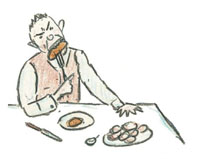
Tuesday, 25 July
Good weather continues. Got a letter today from Agnes. She is coming home on Saturday. My word. So I wrote her a love letter in return. Worked late tonight and then took car to Dumbreck and went what we used to call the complete walk. Got home at 11 p.m. British still advancing. Last night’s list: dead 686, wounded etc. 3,565.
Friday, 28 July
Cleaned all the windows at night, polished the grate and washed round the room, lobby, scullery etc. At 1 a.m. I took supper. 104th week of the war, 158th day of Verdun battle, 29th day of Battle of the Somme.
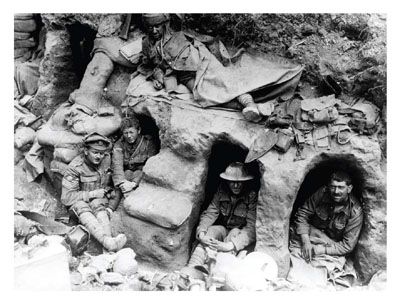
Rose at 5.30 a.m. and washed the floor, scrubbed the table and did the name plate, bell etc. Got my holidays today. Gave the house its final polish. Went to St Enoch Station and met my dearly beloveds at 6.30 p.m., both looking fit and well. Zeppelin raid in east coast of England. No damage.
Sunday, 30 July
None of us out today. Too busy looking at each other. Being troubled much since yesterday afternoon with a certain looseness of the bowels, I went to the chemist in the morning who gave me a bottle which ‘strafed’ the complaint.
Monday, 31 July
My holidays start today. Went in the forenoon to the Art Galleries and got my mind and soul elevated. After dinner we all went to Pollok Estate. After tea we visited Greenlodge Terrace. Josephine has started work as a grocer in Cochranes’ shop at Bridgeton Cross. Weekend casualty list: dead 903, wounded etc. 4,106.
Wednesday, 2 August
In the forenoon I went down to Bellahouston Hospital and after some coaxing managed to get in and saw James, who was wounded in the hand in the ‘Big Push’.43
Thursday, 3 August
Went into town before dinner and paid the factor and the fire insurance. After dinner Agnes went and saw the doctor and then we all went to town and visited the St Enoch Picture House and saw Charlie.44 I spent the rest of the night getting ready – I’m going to Belfast for a week. Another Zepp raid on England.
After a fond farewell to my wife and child last night, I left at 10.15 and got train from Central at 11 p.m. Boat left Ardrossan at 12.45 p.m. Arrived Belfast after a very reasonable sail about 7 a.m. Went to Northern County Station with my bag and got a wash up. Then hunted up my breakfast. Had a look round for ‘digs’. Went to see my aunt, and decided to stay there. After dinner I visited Smithfield, and the museum.45 After tea my uncle and I had a walk round by the dam and then went down to station and lifted my bag. This is anniversary of the war.
Saturday, 5 August
In forenoon I started to explore Belfast. Had a look at County Down Station and as far as Holywood Arches, and came home. After dinner went down to Falls Park and then took car to Bloomfield.46 After tea I had a seat in Woodvale Park and went down town. Got home 10.15 p.m. Weather perfect.
Sunday, 6 August
In the forenoon I took my aunt a run in the car and had a seat in the Alexandra Park. After dinner I went to Ormeau Park and admired all the little Colleens. After tea I walked out past Ligoniel and back by Horseshoe Rail, got car home from Cliftonville.47 Home 10.30 p.m. Weekend list – dead 1,751, wounded etc. 4,377.
Opposite page Newtownards lies 10 miles east of Belfast, at the northern end of Strangford Lough, and Mount Stewart is an eighteeenth-century house and garden, the home of the Londonderry family. The Somme Heritage Centre, which opened in 1994, stands a little to the north of Newtownards.


Wee Tommy’s birthday. More lovely weather. Sawed and chopped wood for a while. Had a crack and small walk with Minnie and then looked up the kennels. Dined with Jim and then had a walk round. Mabel then went part of the way with me to the kennels and I had tea there. Uncle Robert then saw me on to the 5.30 motor. We all parted with deep regret. Caught 6.27 train from Newtownards to Belfast. Big Zepp raid on east coast and part of Scotland, eight killed.
Thursday, 10 August
Very hot day. Took car to Ligoniel and then walked out country, back to town by Cliftonville. Called in at Northern County Station and got my ticket, then did some shopping for a little present for Agnes and Tommy. After dinner went to the dam and read my paper. Said farewell to my aunt and got 6.30 train to Larne and sailed to Stranraer by SS Princess Maud. Had a very nice sail and exactly six hours after leaving Belfast I arrived in St Enoch’s Station. Walked home and arrived there at 1.30 a.m., where my own wee wife was waiting on me, and had a nice tea ready for me. Amen.
Friday, 11 August
We all slept in today. Naturally spent the day in looking at my well-beloved and my son and heir.
Saturday, 12 August
This is the last day of my holidays, so after breakfast we all took car to Paisley.48 We did the sights and visited the museum, and then had our tea in a tea room. We then went to a picture house, and got home about 6.30 p.m.
Nice sort of day. Working late. Agnes and Tommy came into the place and got me home. The policeman in the key office gave Tommy a penny.49 British destroyer Lasso mined or torpedoed off Dutch coast.
Friday, 18 August
German official list of casualties admits 3,000,087 losses. Austrian losses during June and July 830,000. Tonight’s casualty list – killed 666, wounded etc. 4,166.
Saturday 19 August
We took car to Netherlee in the afternoon. Had a seat in Cathcart Cemetery and admired the view, and then took car home. To get the graveyard taste out of my mouth we went to the Majestic at night.
Tuesday, 22 August
We went to the cathedral at night and listened to an organ recital.50 The organist is a better player than me. Big explosion in Yorkshire munition factory, 40 killed and 60 injured.
Wednesday, 23 August
Poor Wee Tommy not well today. 35 Zeppelins destroyed since war began.
Tommy not much better, in bed all day. What’s it going to be? Agnes got him a motor to keep him cheery.
Friday, 25 August
Rained morning, noon and night. Tommy all right again. Big Zeppelin raid over England including London: eight killed.

Saturday, 26 August
Rained nearly all day. At night we all went to the Majestic. We are getting quite frivolous or reckless.
Tuesday, 29 August
Since 1 July, Britain has taken 15,469 German prisoners and 246 guns.
Wednesday, 30 August
Agnes and Tommy met me in town at 6 p.m. and we went to the picture house and saw The Battle of the Somme.51
James up tonight, the soldier I was down seeing in Bellahouston Hospital on 2 August.
Saturday, 2 September
After tea we all went to the Majestic.
Sunday, 3 September
Great Zeppelin raid on east coast and London: two killed. One of the Zeppelins with its entire crew destroyed near London by one of our aviators.
Monday, 4 September
Tommy’s days of freedom are over. He started today to go to school, one called Victoria School in Batson Street. A momentous event. Poor Tommy. Capital of German East Africa surrenders to British. Great advance by British and French at the Somme battle.
Tuesday, 5 September
The airman who destroyed Zeppelin gets a VC.


110th week of the war. 200th day of the Verdun battle. 70th day of the Battle of the Somme.
Monday, 11 September
Got doctor’s bill today. Puzzle: when will it be paid?
Wednesday, 13 September
After this my dinner hour is from 12.30 p.m. to suit domestic arrangements.52 Mrs Carmichael and Mrs Mackenzie in tonight trying our sewing machine. Great French advance: 1,500 prisoners.
Friday, 15 September
Tommy got a flower from his teacher for being a good boy. Agnes not well at all. She went to the doctor and got a bottle. I’m keeping well so I cleaned the kitchen window. Great British advances in France on six miles of front. Trenches at Thiepval captured.
Saturday, 16 September
British advance continues. Thousands of German prisoners. British using monster armoured motors for charging the trenches.
Entertained the household with music at intervals.

Monday, 18 September
Agnes bought a griddle, or as the Scotch call it, a ‘girdle’, so I have no doubt we’ll be able to bake scones etc.53 British doing brilliant. Our motor monsters knock h… out of the huns.
Tuesday, 19 September
One of Agnes’ cousins, Mollison, Broughty Ferry, killed at the front.
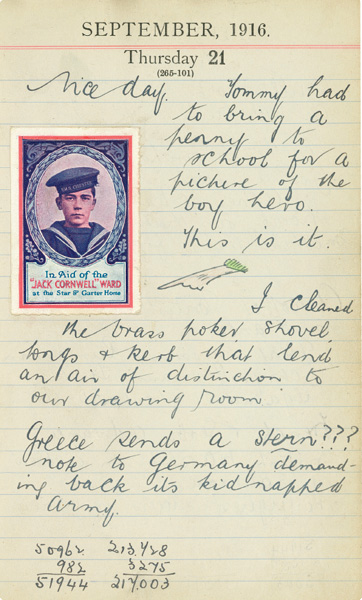
Agnes cleaned the spoons so that folk could mistake them for silver.
Sunday, 24 September
After breakfast I donned my best and strolled down to Govan and looked at the boats. In spite of the U-boat menace, I crossed over the Clyde to Partick by the ferry.54 Great Zeppelin raid over England: 38 killed and 99 injured. Zeppelin brought down in flames and another captured with its crew.
Monday, 25 September
Lovely day. This is the autumn holiday, so Tommy and I had a holiday. Tommy very sick all day, vomited and had a sore head. Went into town after dinner and telegraphed to Coatbridge that we could not come out. Wandered into a picture house in New City Road. Came home for tea and went out for doctor. Tommy’s temperature 102°. Doctor thinks it is his stomach. I don’t know what to think. A melancholy holiday.
Tuesday, 26 September
Doctor up today. Tommy a little better and his temperature down a bit. Another big Zepp raid over England: 36 deaths. Query: when are they coming here? Great Franco-British victory. Thiepval taken by the British and Combles by the French and British. Hoch!
Opposite page John ‘Jack’ Travers Cornwell, who was born in London in January 1900 and was therefore sixteen at the time, was celebrated for his gallantry at the Battle of Jutland. He was posthumously awarded the Victoria Cross, one of the youngest recipients ever. The Boy Cornwell Memorial Fund was established in his memory to provide a wing at a naval hospital. The twenty-first of September 1916 was designated Jack Cornwell Day and every school pupil in the British Empire was asked to give a penny to the fund.
Doctor up again. Tommy a great deal better and his temperature normal. Went myself at night to Greenlodge. Home 11 p.m. To protect my valuable life these dark nights I took my stick la plus grande.55
Thursday, 28 September
Tommy up in the evening. He is getting a little food now.56 School Board officer up for Tommy today. British take more ground. Great damage done to Krupps by the French air raid. Hoch, hoch.
Friday, 29 September
Tommy not so bad now. Doctor up today and I don’t think he is coming back. Amen!
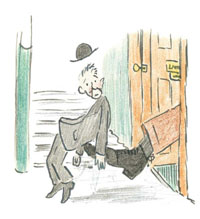
Saturday, 30 September
A threatened scarcity of water, so we filled the house with it. 3,000 dead Germans in Combles. Hoch.

Sunday, 1 October
The old time starts today again, so I put back the clocks one hour last night. Tommy sang a little hymn tonight and I accompanied him on the piano. This will be his first to music, I think.
I mended Alec Carmichael’s ‘scooter’ tonight. British defeat Bulgarians. Roumania gets walloped. Germany going to renew her submarine campaign against Britain.
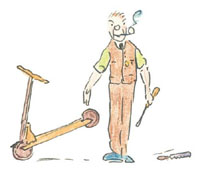
Tuesday, 3 October
Very wet day. Spent a quiet evening at home. Put some studs in Tommy’s boots and shoes.57 Put a bit of wood in the bunker to keep the mice in their place.58
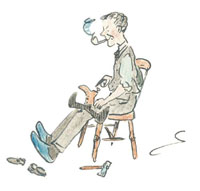
Thursday, 5 October
Nellie here in the afternoon. Jenny Roxburgh here at night. I saw her away at Queen St Station by 10 p.m. train. Bulgars in retreat before the British
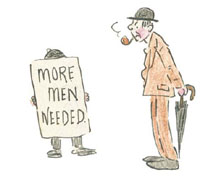
Friday, 6 October
Put a few studs in my boots tonight. British advance further towards Bapaume and we use poison gas at Armentières and Loos. Big Cunard liner Franconia torpedoed in Mediterranean Sea: 12 lives lost.
Saturday, 7 October
Agnes, Tommy and I at Coatbridge by 2.40 train from Buchanan Street. I took a walk down myself to the hotel and had a glass of milk with Mr Crozier.59
Agnes and Tommy at Mrs Carmichael’s church in the afternoon with the aforesaid Mrs Carmichael.
Monday, 9 October
Tommy started school again today. German submarines appear off New York. Several British and neutral boats sunk.
Tuesday, 10 October
America very uneasy about U-boats’ new move.
Friday, 13 October
British ‘tanks’ in action in Macedonia.60 British prisoners in Germany: 30,101. German prisoners in Britain: 39,020.
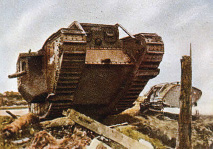
Saturday, 14 October
Weather today is the absolute, absolute limit. Perfect hurricane all day and rain by the bucketful.
Sunday, 15 October
Agnes went to church today, but did not get in. To cheer her up I took her to Sighthill Cemetery after dinner.61 J’y suis, je n’y pas reste.62
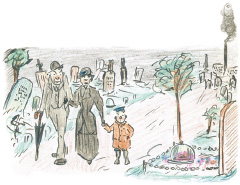
Monday, 16 October
Father in when I got home. He says Donald is very ill. Saw father home, and went up for a little and had a cup of tea. Got home without meeting any of the Redskins.63
Had a musical evening at home. Among those present were Daisy and May Crozier and Hetty Cook. They all sang several songs tastefully accompanied on the piano by Mr Livingstone. I saw Daisy and May off from the Cross about 10.15 p.m. and then took Hetty Cook to Jamaica Street and shoved her on to her car.
Thursday, 19 October
Father here at dinner time. I guessed the worst when I saw him. Donald died this morning. We went over to Greenlodge Terrace at night.
Friday, 20 October
Fine day. Tommy not at school today. I went over to Greenlodge at night to see about funeral. Agnes saw about the wreath today. Another Cunard liner sunk.
Saturday, 21 October
Donald buried today in Riddrie Cemetery.64 I met Duncan, Jack, John Martin and Jack Cavins at Union Street. Took car to Rouken Glen, met Josephine, Lily and Isa and somebody else there, and then Sam turned up. We got car to Barrhead. Funeral left there about 1.15. We got to Riddrie about 3 p.m. and there laid Donald to rest. We went back to Greenlodge for our tea and got home at 8.30 p.m. ‘Naked came I out of my mother’s womb, and naked shall I return thither; the Lord gave and the Lord hath taken away; blessed be the name of the Lord.’65



Thursday, 26 October
British airmen bombard German blast furnaces at Metz.
Saturday, 28 October
Two years ago Lily died, and I often think of her; too often.
Previous page Count Karl von Stürgkh, the Austrian Prime Minister, was assassinated by Dr Friedrich Adler in Vienna on 21 October 1916 as a protest against the war and the suspension of the Austrian parliament.
Nice night. So I went over to Greenlodge for the bed and bedding which Josephine is giving us for Tommy. Duncan helped me over. This is Red Cross flag day. Irish shipping disaster: 90 lives lost.66
Monday, 6 November
My boss intimates to me today that my salary is increased.
Wednesday, 8 November
Total German losses now are 3,755,693 men.
Friday, 10 November
This is the birthday of my wife. Long may she reign.
Saturday, 11 November
We had a sort of party tonight. First came father, then Lily and her boy (Jonny), then Josephine, Isa and Jack, lastly Duncan. They filled our little cabin. We played divers games and had music etc.
Sunday, 12 November
Tommy got a bad cough, so he stayed in bed all day. Agnes not up to the mark. As I said before, my hair is turning grey. I went out before dinner. Took car to Springburn and wandered round by Maryhill.67


The First World War hugely influenced the availability of food and drink in Glasgow, both in terms of quality and quantity. Quality varied as scarce ingredients were replaced by more readily available alternatives: white bread loaves became brown when processed wheat flour was replaced by wholegrain, diluted with potato flour. Quantity was controlled first by the market and then by the government, as imports were reduced by enemy action on the ships that brought meat, grain and other staples to the UK from the countries of the British Empire and other trading partners. The U-boat blockade of the British and Irish isles threatened to starve their citizens into submission. Times were tough, of that there is no doubt, but adding whole grains to white bread probably did people some good. And if pipe tobacco, cigars and cigarettes were in short supply, there were likely health benefits to that too, not that people of the time would necessarily have appreciated this.
A government propaganda poster issued in April 1917 made it plain how Britons would survive the privations. In black type on a plain background, it proclaimed: ‘The enemy is going to be beaten in the homes of Glasgow: The women are going to do it’. This was an exhortation to those in charge of buying food and cooking it not to stockpile supplies and to avoid any waste. At the time the poster was issued, one in four merchant ships heading for British ports was being sunk by U-boats, and there was great concern in government circles that it was only a matter of time before the country would run out of food. In spring 1917, the food stocks of the nation were reduced to a mere three weeks’ worth.
At the start of the war, the government took a hands-off attitude to food production and consumption. Prices rose steeply in 1916, and grocers were accused of making excess profits from the troubled times. In 1917 a propaganda war was launched to encourage thrift, but it was not really until 1918 that the British government introduced food rationing, partly as a reaction to the malnutrition being suffered by the poorest in society. First it was sugar, and then butter, jam, tea, bacon and fresh meat. Sugar was rationed from 31 December 1917 to 29 November 1920; butter from 14 July 1918 to 30 May 1920; margarine from 14 July 1918 to 16 February 1919; lard from 14 July to 16 December 1918; raw meat from 7 April 1918 to 15 December 1919; bacon and ham from 7 April to 28 July 1918; jam from 2 November 1918 to 15 April 1919; and tea from 14 July to 2 December 1918. Each house had three ration cards: a meat card, a card for butter or margarine, and a sugar card. Each adult was allowed 15 ounces of beef, lamb, mutton or pork, five ounces of bacon, four ounces of butter, margarine or lard, and eight ounces of sugar a week. These amounts remained static until rationing was ended.
The government was quicker to act on drinking, concerned that the efficiency of workers, especially those in munitions and other war-related occupations, could be reduced by alcohol consumption. Brewing and distilling also used valuable supplies of fuel, grain and sugar, which were needed for food. The Defence of the Realm Act restricted pub opening hours, and so-called Munition Ale, brewed at a lower strength to reduce the amount of grain needed, was introduced. In October 1915, the government passed the No Treating Order, which banned people from buying alcoholic drinks for others. Duty was raised, too, and the price of a bottle of whisky rose from 4/- in 1914 to £1 in 1918.
For tenement dwellers, the kitchen was the hub of family life. The room was dominated by the fireplace, which usually sat opposite the gas- or coal-fuelled cooker. The cooking range was used to supply hot water for cooking, cleaning and bathing; as a cooking hob and oven; to heat heavy, solid metal irons for ironing clothes; and to provide background heat for the room. The kitchen would also include a sink, various cupboards and shelves where dishes, pans and cooking utensils were kept, and a scullery where small amounts of perishable foods would have been stored.
The scullery included a window open to the elements, which helped keep the temperature lower there than in the rest of house – though in summer, butter, cheese and milk had to be eaten on the day of purchase. The coal bunker would also be competing for space, while above head height washing would be drying on a pulley, perhaps dripping on to the linoleum floor below. A curtain usually concealed the bed recess, into which a bed frame with a horsehair mattress and heavy bedding was jammed. The space below the bed, and shelves above, were used for storage.
A typical Scottish meal of the period might be Scotch broth (a soup of vegetables and mutton), mince and potatoes (minced beef cooked in gravy with peas and carrots, and served with either whole or mashed potatoes) and potato scones (flat bread made with potato flour) and jam. Agnes was a frequent maker of baked goods and jam, both for her family and for the many visitors who came to the house.
Agnes went to some school at night, where they are teaching war cookery. Times are hard. Eggs 4d each, loaf 5d each, potatoes about 1/10 a stone.
Thursday, 16 November
Andrew’s wife up in the forenoon for a ‘heart to heart’ talk. The paper says I’ve to be re-examined, so here’s luck. I’ll be a ‘sojer’ yet. Blast the Kaiser. Government is going to take control of the food.68 High blinking time.
Friday, 24 November
I’m working late again. Fed up.
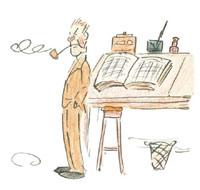
Sunday, 26 November
In the afternoon I took Tommy with me and went up to Sam’s to see how he had got on with the military. He has got exemption.
Tuesday, 28 November
Another Zeppelin raid last night in north of England: two Zepps destroyed. A German aeroplane drops a few bombs on London today. Another naval raid on east coast.
Thursday, 30 November
Government takes over Welsh coal pits.69 St Andrews Day.
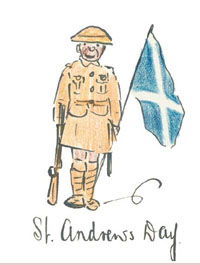
Sunday, 3 December
Rumours of a change in the government. High time or we lose the war.
Our one and only porter at my work on the spree, so I go down to jail and bail him out for two guineas.
Tuesday, 5 December
Attended the court in the morning. Our one and only Barnes fined one guinea. In the name of the firm I paid it. I went to Ruglen to get my allowance of godliness. Agnes washed her hair. Asquith and Lloyd George resign.70
Wednesday, 6 December
Agnes went to the ‘war cookery’ class at night. I stayed in and broke some firewood, mended a little box, sawed a ham bone in two, brushed a few dozen pairs of boots and in the middle put Tommy to bed. Bonar Law refuses the Premiership. The King summons the Cabinet.
Thursday, 7 December
Nellie’s grandmother dead aged 95. A good old age. Lloyd George – Prime Minister.71 Explosion in a munition factory in north of England: 26 women killed.
Friday, 8 December
Saw the Redskins today for the front.72 Some in khaki and four ‘braves’ with their war paint on. A new War Cabinet made – go on with the flaming war!!! Policemen in the back greens tonight making the loyal subjects pull down their blinds.

Saturday, 9 December
Speculated in a War Loaf today.73 Anchor liner Caledonia sunk by U-boat.
Sold our one and only pram today. It has done its duty. We were good friends. Our hearts are broken. Farewell.
Wednesday, 13 December
Had a very sore ear-ache yesterday – am sort of deaf of an ear today. Germany desires peace and makes peace proposals, which I don’t think will be accepted.
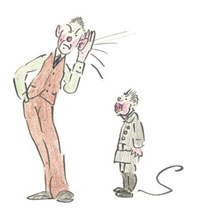
Thursday, 14 December
Germany’s peace proposals get the frozen shoulder.
Sunday, 17 December
Rose before the break of day. Made two cups of tea, one for my one and only, and other for myself. Then took a walk to Ruglen by the country and home by Oatlands. Very foggy and frosty.
Wednesday, 20 December
I cleaned a few boots. Lloyd George makes a great speech.74 No peace. British nation to be mobilised. Go on with the war.
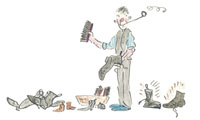
Friday, 22 December
Sent off a few hundred Christmas cards.
Saturday, 23 December
Took a walk out to Ruglen in afternoon and made my tailor accept a little present of money.

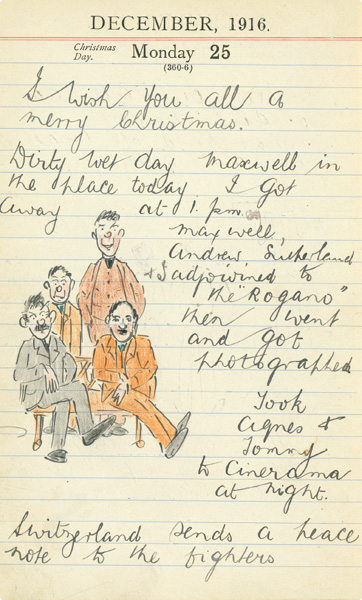


Friday, 29 December
Rose at cock crow and cleaned room windows. Did a little joiner work tonight. Sorted up the wooden bed fittings to suit the room. Brilliant success.
Saturday, 30 December
Cleaned the kitchen window and then went to Langside Library for mental refreshment. The house is about ready now for the New Year.
Sunday, 31 December
We are now sitting up to see the New Year come in, trusting and hoping that the incoming year will bring peace, happiness and prosperity. Amen.
Previous page Rogano, now best known as Glasgow’s oldest and most refined restaurant, was previously an up-market bar with the ambience of a gentleman’s club. The four young gentlemen were clearly living beyond their means for an hour or two on Christmas Day.
1 The P&O liner SS Persia was travelling from London to India when it was torpedoed without warning by submarine U38 on 30 December 1915, about 70 miles off the coast of Crete. Of the 501 people on board, 167 survived. Among the passengers was Lord Montagu of Beaulieu.
2 Thomas evidently has a soft spot for Miss Cook, his wife’s young cousin.
3 The Tigris Corps, under Lieutenant-General Sir Fenton Aylmer, was tasked with the relief of Kut in Mesopotamia, where Major-General Charles Townshend’s 6th (Indian) Division was under siege by Turkish troops.
4 The Zuider Zee flood on 14 January 1916 breached a number of dykes and inundated the low-lying lands of North Holland and Friesland. Following this disaster, the government of the Dutch built the barrier dam that turned the Zuider Zee into an inland lake.
5 This Latin phrase (actually ‘Ex fumo fama’) is the motto of the Royal Burgh of Rutherglen. It means ‘fame from smoke’, and refers to the heavy industry that brought prosperity if not exactly fame to the region.
6 The conflagration destroyed much of Bergen, the second-largest city in Norway.
7 The British submarine HMS H6 ran aground off Ameland Island, part of the Netherlands, with no loss of life on 19 January 1916. The crew were interned at Groningen.
8 On 20 January Russian troops captured Sultanabad in Persia and made great progress in Armenia.
9 The Tigris Corps, on its way to relieve the British forces under siege at Kut al-Amara, arrived at the Tigris River on 22 January, where they were attacked by a large Turkish force.
10 The Rent Restrictions Act, introduced in December 1915, controlled rents during wartime.
11 The British-owned liner Appam had been captured off the African coast by a German raider, which had installed a prize crew to take charge of the liner. She sailed into the harbour at Hampton Roads, Virginia, with 429 captives and a 22-strong German prize crew. Under international law, the German crew could ask a Prize Court to award them ownership of the captured vessel, or prize.
12 Fire raged through the Canadian parliament buildings in Ottawa on 3 February 1916. The entire centre block, with the exception of the Library of Parliament, was destroyed and seven people died. Despite rumours of enemy sabotage, a Royal Commission ruled that the fire was accidental.
13 Literally ‘high’ in German, used here as a cheer to mean ‘hurrah!’.
14 On 11 February the Arethusa, which took part in the first significant naval action in the North Sea in August 1914, was hit a mine off Felixstowe. Six people died.
15 The Russians captured Erzerum in Turkey on 16 February, taking almost 13,000 prisoners and 323 guns.
16 The Allies spent 18 months fighting to control the Cameroons, a German protectorate on the coast of western Africa.
17 The government introduced blackout regulations in areas where they thought Zeppelins might attack. Street lighting was dimmed or turned off, and householders and business owners were required to make sure that no light escaped from their premises at night.
18 The SS Maloja, the largest vessel in the P&O fleet, struck a mine within view of Dover on the morning of 27 February: 155 were drowned. The Empress of Fort William, which came to the rescue of the Maloja, struck a second mine, with no losses.
19 The Military Act gave some exemptions to conscription, such as people with ill health, those whose jobs were judged to be of national importance or those who were the sole breadwinner in a family.
20 Govanhill and the Gorbals, the neighbourhood immediately to the north, had a substantial Jewish population. There was a mikvah, or ritual bath-house, in South Portland Street in the Gorbals.
21 ‘Keep the Home Fires Burning’ was a hugely popular wartime song written by Ivor Novello and Lena Ford in 1914.
22 Alfred von Tirpitz, Commander of the German Navy, firmly believed in a policy of sinking any shipping that could be of aid to the enemy, which angered the neutral Americans. He resigned to appease Washington and prevent the United States stepping into the war.
23 The quote is from Hyperion by Henry Wadsworth Longfellow.
24 The Salon Picture House stood at 90 Sauchiehall Street. She, which was released in 1916, starred Alice Delysia and Henry Victor.
25 There were a number of strikes in Glasgow in early 1916, over the employment of women in the heavy industries. The authorities were quick to suppress them, and workers’ leaders were arrested and tried.
26 Bantam regiments were made up of volunteers who were fit but below the minimum height requirement of the army. Many of them were miners.
27 ‘They shall not pass.’ The rallying cry of the French military leader, Henri Pétain, who defended Verdun from the Germans.
28 John Maclean, a self-educated Marxist who vehemently opposed the war, had been arrested on charges of sedition. He was found guilty at the High Court in Edinburgh on 11 April 1916, and sentenced to three years penal servitude.
29 The German ship Libau, which was disguised as a Norwegian fishing trawler, failed to meet its Irish contacts, and was scuttled after being intercepted by the British navy.
30 The British forces under Townshend had been besieged in Kut, Mesopotamia by Ottoman forces since December 1915. Despite sending a British relief expedition under Aylmer, an attempt to buy their way out, and an appeal for help to Russia, Townshend capitulated after 147 days and 13,000 British Empire soldiers were taken prisoner.
31 ‘Ireland for ever’ in Irish.
32 In a series of courts martial beginning on 2 May 90 people were sentenced to death. Fifteen were executed by firing squad between 3 and 12 May.
33 Easter Uprising leader James Connolly, who was born in Edinburgh, was executed by firing squad while tied to a chair. He was too seriously wounded to stand.
34 The British government introduced British Summer Time as a wartime measure, to save fuel on the home front. Like the restricted pub opening hours, it was not repealed at the end of the war.
35 Lumbago is a general term for lower back pain, usually brought on by lifting heavy weights. Wet washing, presumably, in Agnes’ case.
36 Pyelitis is an inflammation of the renal pelvis, the central part of the kidney. Symptoms include pain and tenderness in the loins, irritability of the bladder, remittent fever, bloody or purulent urine, diarrhoea and vomiting. This is probably what is referred to later in the diary as Agnes’ ‘old trouble’.
37 A diuretic.
38 When Agnes is not able to carry out her household work, the women of the family rally round to help. Thomas may polish some brass or cook breakfast, but he is not expected to wash, dry or iron clothes.
39 Donald’s epilepsy had evidently worsened and he had given up his job in a grocer’s shop, probably in Bridgeton.
40 Holidays for munition workers were suspended until the end of the war.
41 The People’s Palace is a social history museum on Glasgow Green.
42 To ‘mooch’ is to scrounge.
43 This was a temporary military hospital, built at the west end of Bellahouston Park in the south-west of the city, during the First World War. After the war, the injured soldiers were moved to Erskine Hospital.
44 The St Enoch Picture Theatre opened in Argyle Street in 1913, in the former Crouch’s Theatre of Varieties. That night’s programme evidently featured Charlie Chaplin.
45 Smithfield Market, in central Belfast, was a covered market with dozens of shops.
46 Holywood Arches and Bloomfield are neighbourhoods in east Belfast.
47 Ligoniel is a village on the edge of north Belfast, Cliftonville is nearby.
48 Paisley lies eight miles west-south-west of Glasgow and is the county town of Renfrewshire.
49 The key office was presumably where the keys to the various offices, stores and cupboards were kept, supervised by a trusted employee who would record each person who borrowed a key. Perhaps, because of the wartime importance of the shipping company, a policeman had been seconded to the job.
50 Glasgow Cathedral, also known as the High Church, stands about a mile north of Glasgow Cross. It is the principal Church of Scotland, or national Kirk, place of worship in the city.
51 The propaganda film The Battle of the Somme was made by the British Topical Committee for War Films, and released on 10 August 1916. In using footage of the first days of the battle it exposed the home front for the first time to the horrors of mechanised warfare.
52 To tie in with Tommy’s school timetable.
53 The reference to the Scotch betrays Thomas’ Irish roots.
54 Thomas is being facetious. The ferry crosses an upriver stretch of the River Clyde, far from the open sea.
55 His biggest stick.
56 School Board inspectors visited houses where children were known to live if they were not attending school. This was designed to deter truants.
57 Studs are small metal plates attached to nails, which are hammered into the soles and heels of shoes to lessen wear on the leather.
58 Thomas evidently suspects that the mice are coming into the kitchen through a hole in the coal bunker.
59 The milk may have been something stronger.
60 The first tanks were used during the Battle of the Somme in August 1916. The Royal Tank Regiment was formed from the Heavy Machine Gun Corps earlier that year.
61 Sighthill Cemetery, opened in 1840 as Glasgow’s second garden cemetery, stands about one mile north of the cathedral.
62 Tommy has adapted the French expression ‘J’y suis, j’y reste’ (‘Here I am and here I stay’) to mean ‘Here I am, here I don’t stay’ in reference to his cemetery visit (‘J’y suis, je n’y reste pas’ is the correct usage).
63 Troublemakers. Thomas is casting himself as a frontier scout or cowboy, in danger of attack from hostile Native Americans.
64 Riddrie Cemetery lies in Riddrie, a suburb in the north-east of Glasgow.
65 From the Book of Job.
66 Passenger ship the Connemara collided with a coal transporter and sank at the mouth of Carlingford Lough, in the north of Ireland, on 3 November 1916. More than 90 people were killed.
67 Springburn and Maryhill are working-class districts in the north-west of Glasgow.
68 The government appointed Lord Devonport as Food Controller, to regulate the supply of food and to encourage food production, and hinted that it would take control of bread production.
69 The government announced on 29 November 1916 that the Board of Trade would take control of the south Wales coalfield from 1 December 1916, to ensure supplies.
70 On 1 December, Lloyd George, Secretary of State for War, declared that he could no longer be part of the coalition government. On 3 December, Herbert Asquith, who had been Prime Minister since 1908, and who was facing mounting criticism over his handling of the war, announced that he would reconstruct the government. The following day, the King approved the reconstruction, and on 5 December both Lloyd George and Asquith resigned their positions.
71 Lloyd George was Prime Minister from 1916 until 1922.
72 More than 400 Native Americans from the western plains of Canada fought for the British Empire in the First World War.
73 The War Loaf was made with whole wheat and other grains as well as potato flour. It had a darker colour that the usual bread, which was made from wheat grain alone.
74 Lloyd George made his first speech as Prime Minister on 19 December 1916. He laid out his government’s plan for conscription, the state control of shipping and other critical issues.